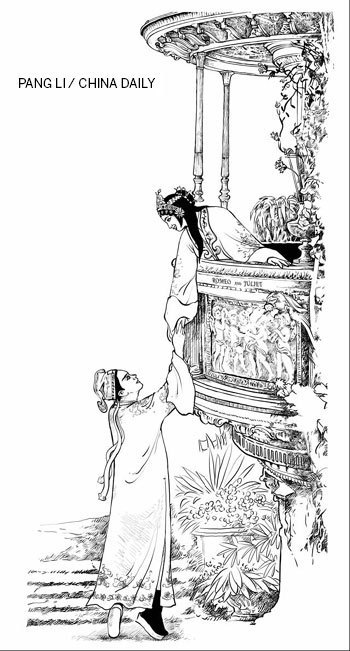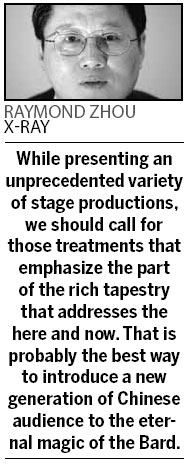Shakespeare on the Chinese stage

The Bard's presence is taken for granted, but his appeal needs to be fine-tuned to click with a local audience inundated with rapidly growing offerings of stage works.
There are two things that stand out in Propeller's upcoming tour to China. One is Henry V and The Winter's Tale are not among the most familiar repertory pieces to Chinese theatergoers. Second, the all-male cast from the UK-based theater company has a curiosity factor that will more likely win nods of approval than glowers of contempt.
In the old days, Peking Opera did not permit women performers, possibly to shield women from unwanted attention. Cross-dressing roles have been a fixture in Chinese entertainment, which diminished with women's liberation but have recently made a sporadic revival.
Shakespeare has always been a larger-than-life figure in China. Ever since a student body put on The Merchants of Venice in Shanghai in 1902, Shakespeare has graced Chinese stages with a special magnetism.
When I was in college (in the early 1980s), my first big-ticket purchase was a Chinese translation of all of Shakespeare's works. It was 11 volumes.
Before the age of online bookstores and delivery, I had to lug the bundle all the way to the dorm. After many moves, I still have the whole collection.
Most of the plays in that set were translated by Zhu Shenghao, a linguistic genius who toiled under the most difficult situations to render Shakespeare accessible to the Chinese-reading populace.
Fires from the Japanese invasion destroyed some of his manuscripts, and poor health hindered him from finishing his self-designated mission. He was only 32 when he died in 1944, leaving behind 31 translated plays.
What sagacity he had in understanding the Bard's immortal words! And what a mastery of the Chinese language! Zhu's words accurately convey the original's power and beauty, a trait lost among men of letters in our era.
The first time I saw Shakespeare on the Chinese stage was in the spring of 1986, when China launched its first Shakespeare festival.
There were 26 productions in Beijing and Shanghai. I caught half a dozen in the capital city.
Due to financial constraints, most adopted a minimalist style.

I remember A Midsummer Night's Dream with a handful of ropes that were meant to be the forest. But a college production of Timon of Athens, in English no less, was so ingeniously conceived that it gave a new perspective on the story.
Like most Western plays, Shakespeare was given the "exotic" treatment in the early years by receiving the standard wig and foreign look.
Chinese actors were made up and decked out to strive for some resemblance with Caucasians.
A lot of mannerisms, including the way lines were delivered, were grossly exaggerated because what little exposure to Western culture we had at the time was from the few imported dubbed movies. Foreigners were supposed to sound "foreign", even when they speak Chinese.
Even back then, there were efforts to assimilate Shakespeare into Chinese culture.
Twelfth Night and The Winter's Tale were made into Shaoxing Opera (Yueju). Macbeth turned into a Kunqu Opera version of Blood Handprints. Othello received a Peking Opera retelling, and Much Ado About Nothing fit nicely into the comedic music of Huangmei Opera.
By some estimate, as many as 16 forms of Chinese opera have made adaptations of Shakespeare, bringing the Bard much closer to the masses.
Names like Hamlet, Romeo and Juliet have long reached beyond the circle of intelligentsia and become buzzwords for general use.
But it has been rare to see a Shakespeare production - a localized one - that truly resonates with the Chinese public.
The Bard is held in high esteem, but he is more revered than loved. His works are for all ages, but they seem out of touch with today's China - at least that's the impression I got from Chinese stagings, which is by no means a complete cross-section.
Respectable productions abound,but imaginative ones are few and far between.
I once watched Othello in Guangdong's provincial capital Guangzhou, but it didn't shed any light on race relations. The glints of wisdom seemed to be overwhelmed by the set and costumes.
It is when people are not timid and awed that they tend to give the Bard a personal and interesting spin. A 2007 production of A Midsummer Night's Dream at Beijing's Poly Theater was so delightful that a couple of Broadway impresarios sitting next to me did not miss a beat - without English translation whatsoever.
Professor Liang Bolong of the Central Academy of Drama had devised a complete set of dance-like moves for the comedy routine, somewhat in the spirit of Peking Opera movements but more in keeping with the plot twists.
The casting of a new talent from a television contest in the role of one of the mechanicals turned from a gimmick into the surprise of the night. He almost stole the show with well-timed physical comedy never seen in his high-profile television appearances.
I once asked Stan Lai, the Taiwan playwright and stage director, about the right approach to staging Western classics.
He answered that the key is to bring out the relevancy to the present.
Unfortunately, with his growing opus of self-written and self-directed modern classics, there is little chance Lai will be invited to do a Shakespeare play here.
Lin Zhaohua is the rare stage director with a penetrating look at Western classics and an intrepid flair for attacking both the familiar and the obscure.
His rendition of Hamlet, dating back to 1990, is so expressionistic that you cannot tell when and where the story is set. He also loves to have other versions performed back-to-back with his - for example, one from Kazakhstan and another from Germany - with the climax duel replaced by a series of to-be-or-not-to-be word play.
Lin's most successful outing in Shakespeare is his unique interpretation of Coriolanus, localized in Chinese as General Kou Liulan.
The 2007 production had two heavy-metal bands, one on each flank of the stage. The loud music obliquely commented on the mob mentality, which is so crucial to this story.
Chinese have reserved a special pantheon for Shakespeare.
During Premier Wen Jiabao's 2011 tour of the United Kingdom, he made it a point to visit Stratford-upon-Avon, Shakespeare's hometown.
A tour of the Old Vic production of Richard III, starring Oscar winner Kevin Spacey, sold out so fast that Beijing's National Center for the Performing Arts had to squeeze in a matinee at the last minute.
A Chinese production of the same play by the National Theater of China, with Chinese elements thrown in, recently won applause in London when it was staged at the local Shakespeare Festival.
Shakespeare can no longer conjure news headlines in today's China. Most of Lin's productions feature the inimitable Pu Cunxin, a screen celebrity with a sizable following, hence accounting for some of their popularity.
However, that is no reason we should let the Bard slip into stage mediocrity. While presenting an unprecedented variety of stage productions, we should call for those treatments that emphasize the part of the rich tapestry that addresses the here and now.
That is probably the best way to introduce a new generation of Chinese audience to the eternal magic of the Bard.


















